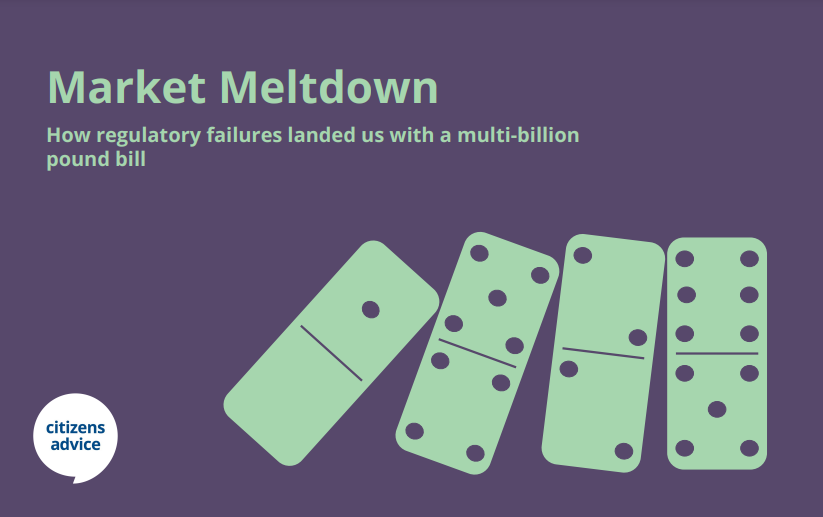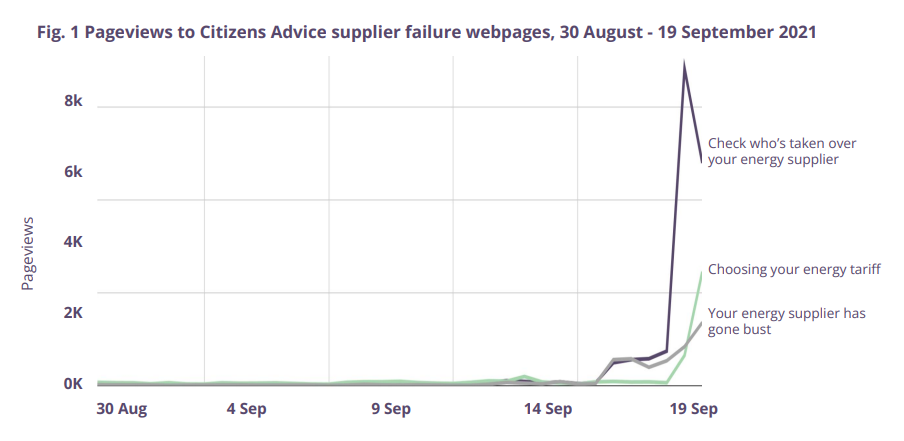
Taken from Report ‘Marketing Meltdown’.
Consumers are paying twice – with poor service – and now for the cost of energy companies failing. This can’t happen again.
The Campaign
Since September 2021, a significant energy crisis has hit countries across Western Europe as suppliers started failing at record speed, with four million customers across almost 30 companies affected.
Citizens Advice focused first on gathering information and sharing this with consumers via its network of trained advisers, and through media, and social media. It reached 40 million people via the media and over 300,000 people across social media channels.
They anticipated that people moving to new suppliers would pay higher bills and lose their eligibility for vital support, so they lobbied decision-makers privately and publicly to change the rules and protect consumers.
Finally, seeing the scale of harm caused by supplier failures, including the billions of pounds that billpayers would shoulder as a result, they gathered and published exhaustive evidence on the failures of the market and set out what was needed to ensure this didn’t happen again.

Taken from Report ‘Marketing Meltdown’.
Against the backdrop of an unprecedented energy crisis hitting the pockets of ordinary consumers, it’s an honour to be recognised for our work protecting households through the provision of frontline advice and by securing vital policy changes.”
The Change
Because of their campaigning, consumers were better informed and protected as the market collapsed. In the longer term, campaigning on ‘market meltdown’ placed the cost of energy company failures into the spotlight, spurring Ofgem to set out a wide-ranging set of reforms to help the market function in the interests of consumers.
Short term, they successfully convinced decision-makers to ensure customers of failed energy companies would retain their eligibility for the Warm Home Discount if they moved to a new company. Campaigning also helped secure the £500m Household Support Fund announced in late September to tackle a range of cost-of-living pressures. They also worked closely with Ofgem to improve the process when an energy company failed.
The campaign prompted significant changes at Ofgem, including an admission by the Chief Executive of a culture that has promoted competition at the expense of consumers. Ofgem will now perform rigorous financial checks on energy companies and have committed to improve their enforcement of existing protections for consumers.
Finally, local Citizens Advice charities were empowered to have meaningful conversations with local decision-makers about a technical and tricky subject, showing how important protections in consumer markets are to their constituents.
The Future
Consumers continue to pay the price for volatility in the energy market, now through soaring energy prices. Citizens Advice has spoken of breaking unwelcome records and, for the third successive month, it has referred more people to food banks and charitable support than ever before.
They will continue pressuring Ofgem to be more robust with energy companies on rule-breaking, particularly on their obligations to consumers, as people will expect more for their money. They will also call for financial support for households struggling to pay their energy bills and additional support to help people make their homes more energy efficient.
Who else was involved?
The Citizens Advice consumer service and Extra Help Unit were a lifeline to consumers in the energy market, providing advice and support to consumers encountering difficulties when their supplier failed, and sharing their insights with the energy policy team. Their expertise and responsiveness provided reassurance and, in many cases, money in the pockets of thousands of consumers.


